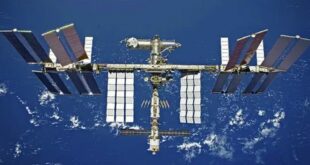
In the first of our week-long #SWMEThemes on the Middle East and Space Resources, Dr. Tom James of Navitas Resources LLP argues that with its heritage in extracting oil and gas from harsh environments and recent investments in space programmes, many Middle Eastern countries are well-placed to take advantage of the nascent space resources economy.
The new space resources economy will provide huge benefits for mankind, from pushing technologies forward as we find ways to live sustainably beyond our planet, to improved earth observations to help protect and preserve and improve life back on Earth, to creating new jobs, companies, and opportunities. The Middle East is pouring petrodollars in to the new space economy as it drives its economies to a service and knowledge-based economy and builds its stake in the future of the human race.
As we have witnessed over the past ten years especially, the space industry has becoming more commercialised, with greater investment by the private sector, such as Elon Musk’s SpaceX and Sir Richard Branson’s Virgin Galactic. Both firms have investors from the Middle East, and Virgin Galactic hopes to utilise a spaceport in Abu Dhabi. These new space entrepreneurs are focussed on costs, and this has helped bring downward pressure on launch prices and cost-saving advances in satellite technology have combined to open the door for small and midsize space companies to enter the market, providing new niche services and solutions. These companies, many of whom are basing themselves in the Gulf thanks to pro-active local government support, are well-positioned to serve the increasing demand for bandwidth and services across regions that expect to see large population growth, such as Asia, Africa, and the Middle East.
Since Astronaut Gene Cernan was the last man to walk on the moon 45 years ago, we have made little to no progress on new rocket technology or costs or performance of space vehicles, with governments sticking to what worked in the 1960’s and 1970’s. Now with private firms driving the space race with much larger resources than most governments, we stand on the brink of returning to space – this time, to stay. With the annual space economy already sized at U.S.$330 billion a year, its an interesting business to get in to and its attracting increased interest from investors and entrepreneurs.
To really drive the new space economy forward however, we must first reduce the cost of getting “stuff” in to space from the Earth’s surface. In space there are many asteroids and mining opportunities for resources to build new larger space ships and space stations and lower costs, but the initial machinery and people to make that happen will have to come from the Earth’s surface.
Therefore, the most immediate valuable resource that people will pay a premium for in space will initially be water. Made up of hydrogen and oxygen, there is a lot of things you can do with it!
Therefore water has been dubbed the new oil in space and Middle East investors understand the opportunities, as their investment in new emerging commercial space companies and technologies is growing as the region works to shift from an oil-based to a knowledge-based economy and secure a part in the future of supplying energy in space.
Water as Fuel
I expect companies to launch satellites searching for rare gases and metals in asteroids within five years, with actual mining happening within eight. A single asteroid might contain 175 times more platinum than the Earth mines in a year, but its not metal that is the most important commodity in the short term. Its water.
In the long term, most of the commodities mined in space will stay in space to power a low-orbit space economy built around satellites and space stations. In that scenario, water accumulated in space would become the most immediately valuable commodity as it could be used for rocket fuel for interstellar voyages, and to supply oxygen to keep astronauts and space colonies alive. To date all the water for space missions and all the rocket fuel has to be taken to space from the Earth’s surface and that costs a lot of money as it increases the payload of rockets that must escape the Earth’s gravity.
A major issue in making access to space cheaper is that every space mission must carry its own fuel for in-space operations, since in-space refuelling does not currently exist. Even if it did, that fuel would have to be lifted and stored on orbit in fuel depots at even higher prices. Currently it costs around U.S.$8,000/kg to $12,000/kg net cost to launch most payloads into low-Earth orbit (LEO). New breakthroughs in technology must be realized to significantly reduce this high cost. We are starting to see some of those technologies now succeed, for example the SpaceX Falcon 9 rocket which is truly re-usable and lands itself after a successful deployment of cargo to space. This type of technology, combined with the large reduction in payload in fuel and supplies, is necessary to refuel in space with water and oxygen already extracted there will massively reduce payloads and cost still further. The corresponding cost and price benefit could give customers around a 30 percent discount over expendable rocket versions.
To avoid this high-cost barrier to real progress, a means to provide cheaper propellants in space has to be developed. One such firm, Shackleton Energy, is working on the answer by proposing to mine ice water on the Moon. Water is made up of oxygen and hydrogen, and in turn can create fuel, drinking water, and oxygen to sustain long term colonies in space.
Middle East in Space
The UAE and Saudi Arabia already have space programmes, with the Saudis signing a pact with Russia in 2015 for cooperation on space exploration and the development of a new space station. With the annual space economy having grown to already U.S.$330 billion dollars it is an interesting time for Middle East countries, that must plan many decades ahead in the development of their economies in to digital- and knowledge-based economies, to get in to the space business. Interestingly the majority of the recent growth in the space economy, in absolute terms and as a percentage, took place on the commercial side of the space economy. Commercial products, services, infrastructure, and support industries add up to slightly more than 75% of the space economy, with government spending (24% of total) constituting the remainder. That’s right – government spending is now the minority!
Besides investing petrodollars in to a new economy of the future for their society here on Earth, building a space industry in many countries of the Middle East makes a lot of sense from a geographical standpoint. The closer a country is to the equator, the more surface velocity there is from spinning around the Earth’s axis, meaning space ships need to burn less fuel to exit the atmosphere. In addition from a communication standpoint it is better to have an orbit around the equator and if you launch away from the equator you must burn a lot of extra fuel to correct the trajectory of your rockets after launch. All of this benefits a number of Middle Eastern countries as potential launch sites.
Dr. Tom James has been involved in energy and commodity markets since 1989 and is an international business architect, risk manager, and trading director, having developed his skills and expertise over the years whilst at top tier financial and trading institutions

around the world. He has been consulting to industry since 2004 when he was head-hunted to be a lead designer and risk management advisor for BHP Billiton’s commodity trading unit. More recently, he has been a Senior Energy Advisor to the United States Department of Defense. During his career, Tom has written and published seven books on commodity markets and trading. Tom is a frequent speaker at energy and commodity conferences in Asia, Africa, and the Middle East, and runs training courses throughout the world. He is also a regular commentator on market trends for international news channels including Bloomberg Hong Kong, CNBC, CNBC Asia, and BBC World Service.
Original published at: https://spacewatch.global/2017/07/swmethemes-middle-east-new-space-resource-economy/
 SpaceWatch.Global An independent perspective on space
SpaceWatch.Global An independent perspective on space

